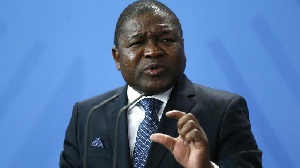 Mozambican President Filipe Nyusi
Mozambican President Filipe Nyusi
President Cyril Ramaphosa has invoked imali-imali diplomacy to help his beleaguered eastern neighbour, Mozambique.
The stakes in Mozambique are high, driven by the lure of gas reserves totalling $60 billion (about R1 trillion) in the northern Cabo Delgado enclave.
It is attracting the single largest aggregate foreign direct investment (FDI), in excess of $55bn, for natural resource exploitation in Africa. The fact that the region has experienced a militant insurgency to do with a power struggle over control of natural resources since 2017 is a mere distraction.
A parade of suitors – multilaterals including the International Monetary Fund (IMF), the African Development Bank (AfDB) and the Southern African Development Community; FDI investors from the US, France, China and Italy; guarantors such as the South African government; and rating agency Fitch – are convinced the security situation is under control and President Filipe Nyusi’s government “would continue to step-up security spending”.
Last month African Export-Import Bank (Afreximbank) committed $400 million in guarantees and direct lending to the $24bn Area 1 LNG Project in the Golfinho-Atum gas field in the offshore Rovuma basin, being developed by a consortium led by France’s Total and expected to come on stream in 2024.
The guarantees are co-financed with Export Credit Insurance Corporation of South Africa (ECIC) under the South Africa-Africa Trade & Investment Promotion Programme.
The ECIC is involved in the Mozambique gas projects which also include the Coral FLNG Project (led by ENI and ExxonMobil) worth $4.7bn, and Rovuma LNG Project (led by ExxonMobil, ENI and CNPC) worth $30bn.
The Total-led Area 1 project is on track after the company secured Africa’s largest project debt financing of 14.9bn in July, comprising direct and covered loans from 8 Export Credit Agencies (ECAs), including the ECIC, 19 commercial bank facilities including Standard Bank and Absa, and an AfDB loan. The project will probably take two decades to come on stream, subject to a host of caveats – dealing with the long-term economic impact of Covid-19 and containing, if not eradicating, the militant insurgency.
The AfDB and Afreximbank have trumpeted “Made-in-Africa” financing solutions for the continent’s burgeoning multibillion-dollar infrastructure task. They point out the surfeit of liquidity and private capital available.
But, the lack of world-class infrastructure, together with corruption, is the bane of African development and is depriving the continent of its rightful share of global investments.
Banks, private equity purveyors, multilaterals and developers stress the enormity of their intentions in creating jobs, increasing Mozambicans’ standard of living, driving sustainable economic growth for the country and region, while acting as self-styled guardians of the environment.
ECAs are only too willing to use taxpayers’ money to underwrite risks other than project and credit ones, including its foreign debt exposure, which in Mozambique includes political risk covering the insurgency. The ECIC is aiming to provide R20bn commercial and political risk cover for South African firms.
In July, Fitch affirmed Mozambique’s Long-Term Foreign-Currency IDR at below investment grade “CCC”.
Mozambique’s recovery from two cyclones last year, the toll of Covid19 mitigation, for which the IMF disbursed a $309m Rapid Credit Facility, and the security challenge are somehow reflected in the rating. The agency is optimistic about the long-term benefits of the LNG projects, which “could see GDP rebound to 4.3% next year, 8.5% in 2023 and 11% in 2024”.
The challenge for Maputo is how to square investment risks and returns with real economy and social benefits.
Despite Afreximbank president Professor Benedict Oramah’s optimism that the “Mozambique LNG project will create opportunities for the people and drive sustainable economic growth,” and be a model for other development projects, the jury will be out for some time.
NGOs say that for this aspiration to be realised, procurement and implementation could benefit from greater independent oversight and transparency.
The moral onus is as much on the foreign participants as it is on the government of President Filipe Nyusi.